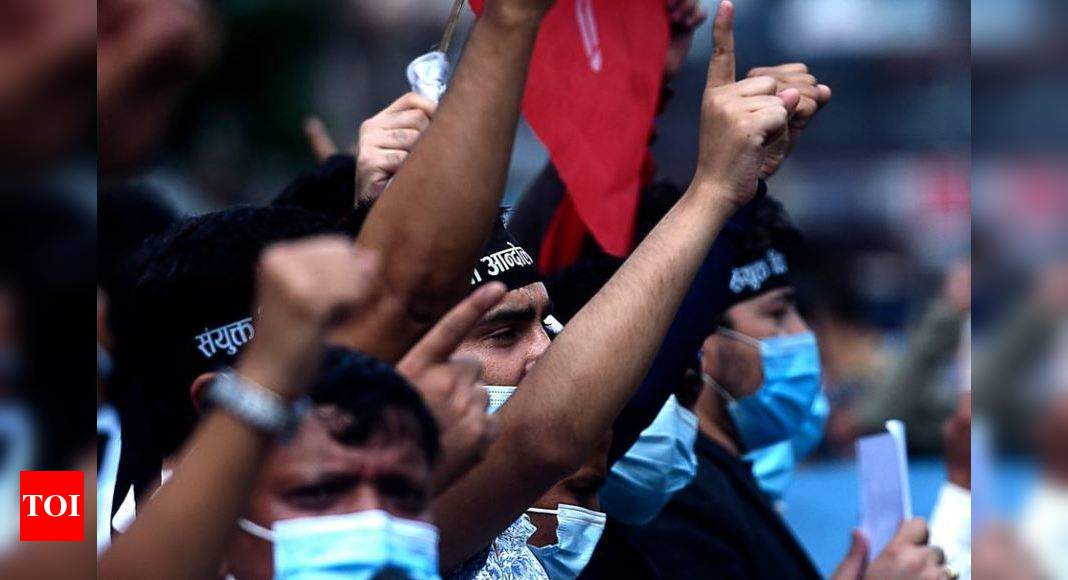Nepal’s election commission prepares for November polls despite uncertainty – Times of India
[ad_1]
Students protest against the dissolution of parliament, in Kathmandu (AFP file photo)
KATHMANDU: Nepal’s election commission is preparing for the mid-term elections in November despite the uncertainty over polls due to the pending petitions in the Supreme Court against the dissolution of the House of Representatives, according to a media report.
At the recommendation of Prime Minister K P Sharma Oli, President Bidya Devi Bhandari dissolved the lower house for the second time in five months on May 22 and announced snap elections on November 12 and November 19.
Prime Minister Oli is currently heading a minority government after losing a trust vote in the 275-member House.
The constitutionality of the President’s move is being heard at the Supreme Court, raising the question if the elections would be held on set dates.
But the Election Commission of Nepal said that it would start to procure materials required for holding the polls next week after the Finance Ministry approved 7.72 Nepalese Rupees billion for holding the elections, The Kathmandu Post reported.
The ministry said it approved the budget for the commission to procure election materials and election management. This budget, however, does not cover the expenses for security arrangements for the polls.
“We are planning to issue a tender next week for all the goods required for holding the elections, except for ballot boxes which we have in adequate numbers,” said Raj Kumar Shrestha, spokesperson at the commission.
Officials at the election body say though the House dissolution case is being challenged in the Supreme Court, the commission cannot say no to holding elections.
The commission is currently preparing the specifications for over 50 types of goods to be procured.
Some of the items that the election body plans to procure are ballot box stickers, identity cards, poll books, security seals, rubber stamps, voting stamps, markers, stamp pad and ink, polythene bag and shack, photocopy paper; glue sticks, stapler machines, scales and scissors and pens.
“Besides these materials, we will also procure medical goods considering the COVID-19 pandemic,” said Komal Dhamala, assistant spokesperson at the commission.
The commission is also updating voters’ lists in different districts.
“More voters will be added for the elections in November,” said Dhamala.
According to him, there will be around 22,000 polling centres for the upcoming elections.
Considering the health risks due to COVID-19, the commission is also preparing health and safety guidelines to make the election process safer.
Some health officials have projected that a third wave of COVID-19 could hit the country around the same time when elections have been planned. Officials at the election body admit the risk and are planning various measures not to turn the elections into a super-spreader event.
“Through code of conduct, we can limit the participation of people in the assembly of political parties,” said Dhamala.
While the commission is making logistical preparations, the political situation continues to remain fragile for holding elections.
Meanwhile, the Supreme Court is likely to pass its verdict on the House of Representatives dissolution case next week as both the petitioners and defendants have concluded their arguments, myrepublica reported.
Some 30 writ petitions have been filed against the dissolution of the House of Representatives.
Oli has given an ultimatum to the Madhav Kumar Nepal-led faction to withdraw the signatures in the writ petition filed at the Supreme Court demanding the restoration of the House of Representatives and the appointment of Nepali Congress President Sher Bahadur Deuba as prime minister.
Nepal plunged into a political crisis on December 20 last year after President Bhandari dissolved the House and announced fresh elections on April 30 and May 10 at the recommendation of Prime Minister Oli, amidst a tussle for power within the ruling Nepal Communist Party (NCP). In February, the apex court reinstated the dissolved House of Representatives, in a setback to embattled Prime Minister Oli who was preparing for snap polls.
Oli repeatedly defended his move to dissolve the House of Representatives, saying some leaders of his party were attempting to form a “parallel government”.
FacebookTwitterLinkedinEMail
[ad_2]
Source link


Comments are closed.